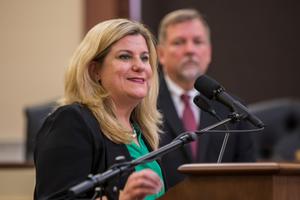Spotlight PA is an independent, non-partisan newsroom powered by The Philadelphia Inquirer in partnership with PennLive/The Patriot-News, TribLIVE/Pittsburgh Tribune-Review, and WITF Public Media. Sign up for our free newsletters.
HARRISBURG — Despite a Senate vote denying her another six years in office, Pennsylvania Victim Advocate Jennifer Storm could remain on the job for weeks — and possibly longer.
Until Democratic Gov. Tom Wolf nominates someone else to head the state office, which advocates for crime victims, Storm will remain in the $133,000-a-year position. Wolf spokesperson Lyndsay Kensinger said the governor, who has another two years left in his term, is reviewing his options but had no immediate plans to name a replacement.
That could allow Storm to remain in the position despite the GOP-controlled Senate’s vote Monday blocking her reconfirmation. Republicans who hold the majority in the chamber overwhelmingly voted against granting her another six-year term, saying that they believed the position should be held by a licensed lawyer, which Storm is not.
The chamber’s top Republican, Joe Scarnati of Jefferson County, also said in remarks on the Senate floor that he had concerns about Storm’s qualifications, and revealed the existence of an ongoing ethics investigation — although he did not provide any details about the inquiry, nor did he say how he learned about it.
Storm, in a wide-ranging interview Tuesday, reiterated her belief that Scarnati was behind both the ethics investigation and the push to remove her from office. She also said she believed he defamed her when he publicly revealed the ethics inquiry, which she said was triggered by a complaint filed by a person represented by a lawyer who does extensive legal work for Senate Republicans.
The lawyer, Matt Haverstick, declined to comment Tuesday on the ethics inquiry, or on Storm’s assertion that Scarnati orchestrated the complaint.
“Why he felt he could stand on the floor of the Senate and violate confidential information and weaponize it to defame and slander me — and it cost me my job,” Storm said of Scarnati, adding that she was consulting with a lawyer about her legal options.
Storm said Scarnati has held a grudge against her because of her fierce advocacy and oustpokenness on behalf of victims of sexual abuse and harassment. That includes a female Senate security staffer who alleged she was harassed by her boss. Senate officials later fired the woman, and Scarnati’s office quietly agreed to pay the legal bills of the man she accused of harassment.
Storm also said Scarnati was angered because of her advocacy for the dozens of victims abused as children by Catholic priests who in 2018 descended on the Capitol advocating for a legislative change which Scarnati vehemently opposed and believed was unconstitutional.
“Joe Scarnati is vindictive. He is a bully. He is the worst of what we would never want to come to expect from state politics and government,” Storm said. “He manipulates his power for his personal gain and he manipulates the processes which he has control over … and he weaponizes those things against people who speak out against him.”
Scarnati, who is retiring from the Senate at the end of the year, declined a request for an interview.
In a statement, he called Storm’s remarks “egregious,” and noted that five Democrats voted with a majority of Republicans Monday to reject her reconfirmation.
“I am shocked and disappointed at the level of anger and hate expressed by Ms. Storm,” he said. “Her continued unprofessionalism is troubling.”
The ethics investigation, Storm has said, involves allegations that she used her position as victim advocate to advance personal and financial interests, including a documentary she filmed about her experience with sexual trauma, addiction, and recovery.
She denied any wrongdoing and said she believes she will be cleared.
In general, ethics investigations are confidential, and findings are only made public if an official is found to have violated the state ethics act. But because of a court ruling a decade ago, people are allowed to publicly discuss these inquiries as long as they don’t work for the Ethics Commission, said Rob Caruso, who heads the commission.
“As more public officials and members of the public become aware the confidentiality restrictions don’t apply [to them], the more they go public,” Caruso said.
100% ESSENTIAL: Spotlight PA relies on funding from foundations and readers like you who are committed to accountability journalism that gets results. Give now and your contribution will be DOUBLED: spotlightpa.org/donate
